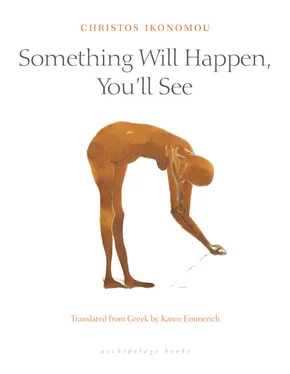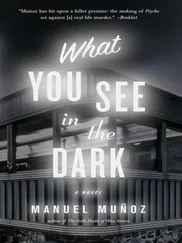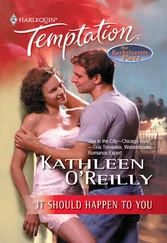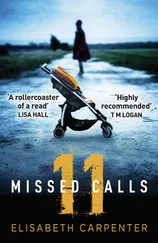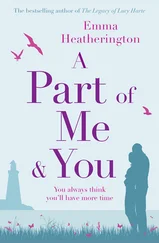We stood with our arms crossed in front of the Scot. Now you could hear a strange, drawn-out hum like something in there was trying to get out.
I went inside and brought out a bottle of Johnny Walker from the holidays that I’d squirreled away. I filled two glasses. I scooped up a plastic cup of ice and every so often we’d toss another piece into our glass. We drank in silence, without clinking or saying cheers.
The sky was so blue it blinded you. The breeze smelled of the sea and french fries. What a beautiful day, I wanted to say. But I didn’t. I thought about what Michalis had said. If you don’t say what you’re feeling at some point you stop feeling it. I thought about what it would be like to write I will be executed on a wall. What it’s like to eat onions and bread day in and day out. To suckle on the juice of the onion and have the juice of the onion be blood. What it’s like to work and save and dream and have those dreams melt like ice, as if there were special hands that existed in this world just for that — to hold the dreams of poor people and squeeze them until they melted like ice. But I didn’t say anything.
Say something in Spanish, I told Michalis. I feel like laughing.
He took a piece of ice from his glass and held it in his palm and stretched out his arm.
With no recipient. No recipient back then and no recipient now.
That’s not Spanish. I want to hear Spanish, man, get it? I want to hear corathon and theboya and muchas cosas. That’s what I want to hear today.
The ice was melting in his palm. We watched the water seeping drip by drip between his fingers until it melted entirely, vanished. Michalis kept on holding his fist stretched out. His hair glinted gold in the sun. I saw him clenching his teeth. His jaw quaked.
Then there was a sound. The Scot suddenly came unblocked and the ice fell jangling into the bin like coins out of a slot machine.
The bin overflowed, the ice cubes started to drop onto the cement.
With no recipient, Michalis said.
The ice cubes kept falling.
We let them fall — we didn’t even care.
Mi corathon. Mi corathon una naranha helada.
We drank and watched the ice fall onto the cement.
My heart. My heart a frozen orange.
Heaped on the cement, the ice cubes had already started to melt.
Something Will Happen, You’ll See
ANOTHER NOTIFICATION came today from the bank. It says it’s a final notification and that next week they’ll take “actions permitted by law.” They’ve called several times too but Niki never picks up. She set the letter on the coffee table in the living room. When Aris came home from work he saw it but didn’t say anything. He didn’t even touch it. He just stood and looked at it with eyes glazed from lack of sleep. Unshaven, in need of a haircut, his sideburns as long as a werewolf’s. Then he took off his shoes and went into the bedroom and collapsed fully dressed onto the bed and pulled the sheet up over his head.
He’s been lying there for three hours. Not speaking. Not moving. You’d think he even stopped breathing.
Niki loads the washing machine, then vacuums and mops. She gets down on all fours to pick up the broken glass from under the kitchen table. The floor smells of tsipouro. She douses it with disinfectant and scrubs until her fingers turn white and start to ache. Every so often she goes over to the bedroom door and looks at him, wondering how long he’ll last.
You’ll suffocate in there, she finally says. Come on out. You’re not going to achieve anything that way.
No response. But Niki knows he’s listening. His left leg is quaking under the sheet. As if he had no control over it — as if it were someone else’s leg, not his.
You have to stay strong, she says. Something will happen, you’ll see. Banks don’t just take people’s homes away. This isn’t America. We’ll manage somehow. You’ll see.
Outside the sun is starting to set. The sunlight has cast an orange patch on the wall over the bed. Niki stares at it, wondering how she never noticed that orange patch on the wall before. She thinks how unfair it is that she doesn’t know what to say to Aris, to make him understand how it feels to be seeing that patch on the wall for the very first time. Last night after helping him to bed she made herself some coffee and turned on the television. Recently she’d been having trouble sleeping and Aris was snoring so loudly that she knew even if she lay down she wouldn’t be able to sleep. There was a documentary on about American Indians but Niki just stared out through the balcony door at the glow from the floodlights over at the electric plant. That afternoon a bunch of workers had climbed up on the chimney and hung a banner and shouted slogans. She watched the beams from the floodlights slicing the darkness like enormous swords and wondered how an artist would paint this scene — if there were still artists left in the world who painted scenes like that: a woman sitting in the dark with a cup of coffee and a cigarette, her face lit by the dim blue light of the television. Wouldn’t be much of a painting. Maybe if she had a gun in her hand, or a vibrator. Coffee and cigarettes wouldn’t cut it. People don’t get excited anymore about old-fashioned things. Who cares about the finances and family problems of the petit bourgeoisie? Très banal. She leaned over to stub out her cigarette and saw a girl on TV who looked like an Indian only she was wearing glasses and modern clothes and talking about the history of her tribe and saying that many many years ago the people of her tribe had been forced to leave their land and as they left some touched the leaves and branches as a way of saying goodbye and others touched the grass and the flowers and the water that bubbled from the springs and the pebbles on the riverbanks, and the soldiers who had come to force them out had watched this peculiar sight and laughed — they didn’t know what it’s like to have to leave a place you love, the girl said. The interviewer asked how she knew about all those things if they’d happened so long ago and the girl said that the truth of a story lies not in its adherence to the facts but in its moral character. When the documentary was over Niki turned off the television opened the balcony door and looked at the beams from the flashlights of the striking workers at the electric plant who seemed prepared to spend all night perched up there on the chimney and as she looked at the dark shapes of the brick buildings and the exhaust towers she remembered her mother saying that in her day all the doctors in that area used to tell new mothers not to breastfeed their babies because the air in those neighborhoods — Haravgi Drapetsona Keratsini — was full of fluorine from the fertilizer plant in Drapetsona and the fluorine got into their milk. Then she went into the bedroom and looked at her husband who was sleeping wrapped up in the sheet with his socks still on and she pulled a jacket over her shoulders and took her coffee and cigarettes and keys and went upstairs onto the roof of the building and looked down at the world spread out all around her. The port the ships the housing projects. The abandoned fertilizer plant the chimneys the water towers. The sky was full of stars and the moon was out but Niki didn’t need any light to see — even with her eyes closed she knew where everything was. The cement factory the slaughterhouses the British Petroleum plant the church of Agios Nikolas. The fishing docks and the boatyards in Perama. In the distance was the industrial island of Psittaleia and then Salamina with its densely clustered neighborhoods: Paloukia Ambelakia Selinia. She grabbed hold of the railing and felt its rough metal scratch her palms. From where she stood she could see the memorial to the battle against the Germans at the electric plant in 1944 which was now surrounded by palm trees and she could see countless unnamed alleys and streets lined with bitter orange trees and mulberry trees and apartment buildings built side by side whose balcony awnings were torn by wind and blackened with age. Her gaze wandered back down to the cars and motorbikes and motorized tricycles and the yards in front of the refugee houses, yards with flowerpots and clothes strung up on lines and old useless things — a broken refrigerator, a bicycle missing its wheels, a three-legged chair, a crib with no slats. Then she looked back at the apartment buildings and at the lighted windows here and there and wondered if other people were up as late as she was tonight or if they’d left those lights on out of fear. And if they were still awake was it because of something good or something bad? And if they’d left the lights on out of fear what were they afraid of? Burglars, or something else? She lit a cigarette and drank her coffee which had grown cold and looked around again and wondered what she would do if one day she was forced to leave this place, the place where she was born and raised and became a woman. If she would go out into the street and say goodbye to the bitter orange trees and mulberry trees by touching their leaves and their branches. If she would touch all the park benches in all the squares and all the utility poles, plastered with posters and funeral announcements and FOR RENT signs. And the red Vespa still chained to the front gate of Thodoris Skoupas’s yard, which he washed every Sunday morning while he was alive and then doused with cologne to make it smell nice. You’d think she was an Indian the way she would run her hands over the metal grate on Asterias’s newspaper stand, which had been closed for years now — run and hide Asterias the anarchists are coming, the kids used to yell who hated him because of the big AEK team poster he’d hung behind the counter. She would touch the wall at the corner of Bosphorus and Mycenae Streets across from the school where a line of faded spray paint read Vacation is the alibi for an eleven-month rape . And the front gate of Voula’s house that’s been crooked since the night last year when her husband came home drunk and drove right into it. She would touch the window of Kosmas’s barber shop where one afternoon twenty years ago she had seen a fifteen-year-old Aris sitting in the chair with his head bowed and his hair in tufts on the floor around him — and how dearly she wishes she could turn back time and sweep all that hair off the floor into her hands and smooth it back onto Aris’s head.
Читать дальше
